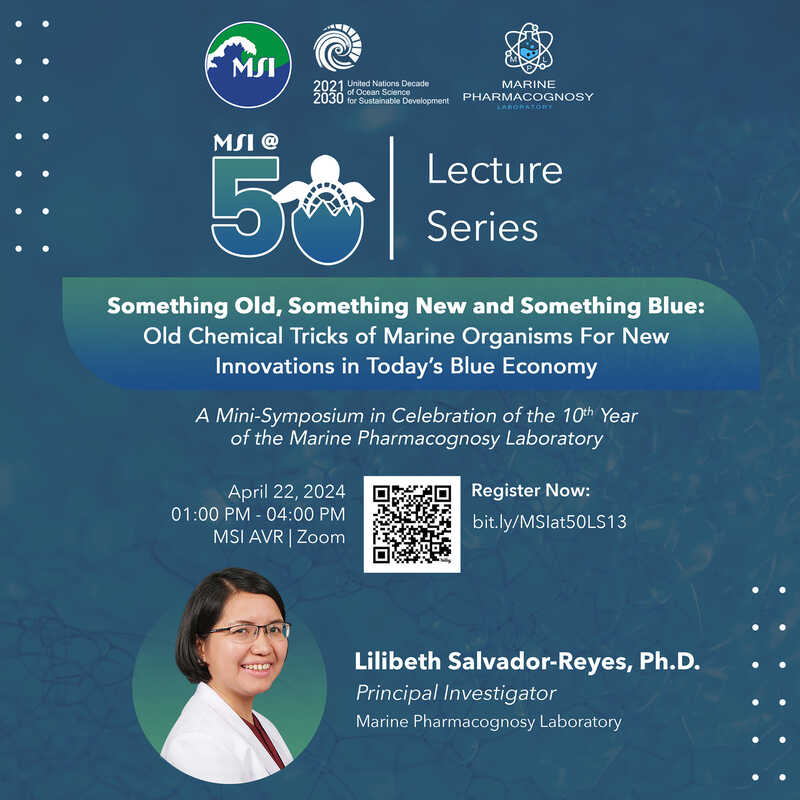Research Summary
Natural products are evolutionarily optimized and validated starting points for the development of valuable products for biomedical and industrial applications. Hence, natural products, particularly from marine organisms, can be dubbed as ‘blue gold’.
Our work at the Marine Science Institute can be subdivided into three broad domains- natural products-initiated drug discovery, establishment of new methodologies to address the supply issue of natural products, and characterization of marine toxins and venoms. Our main focus is on the discovery of natural products from marine organisms such as bacteria, cyanobacteria, sponges, mollusks, seaweeds, and HAB-causative organisms. We are part of two drug discovery consortia in the Philippines: Discovery and Development of Health Products (DDHP) and the Philippine Mollusk Symbiont-International Cooperative Biodiversity Group (PMS-ICBG). Both these projects aim to develop antibiotics, anticancer, and anti-pain agents from molecules produced by marine organisms from the Philippines. In addition, we also spearheaded the assessment of the biotechnological uses of less-studied organisms from the Philippines such as cyanobacteria, and the antimalarial activity assessment of marine microorganisms from the Philippines.
Our work at the Marine Science Institute can be subdivided into three broad domains- natural products-initiated drug discovery, establishment of new methodologies to address the supply issue of natural products, and characterization of marine toxins and venoms. Our main focus is on the discovery of natural products from marine organisms such as bacteria, cyanobacteria, sponges, mollusks, seaweeds, and HAB-causative organisms. We are part of two drug discovery consortia in the Philippines: Discovery and Development of Health Products (DDHP) and the Philippine Mollusk Symbiont-International Cooperative Biodiversity Group (PMS-ICBG). Both these projects aim to develop antibiotics, anticancer, and anti-pain agents from molecules produced by marine organisms from the Philippines. In addition, we also spearheaded the assessment of the biotechnological uses of less-studied organisms from the Philippines such as cyanobacteria, and the antimalarial activity assessment of marine microorganisms from the Philippines.
Recent Publications
|
Peran, J.E. & Salvador-Reyes, L.A. (2024) Modified oxylipins as inhibitors of biofilm formation in Staphylococcus epidermidis. Front. Pharmacol. 15:1379643. doi: 10.3389/fphar.2024.1379643
Casanova, J. R., Villaraza, A. L., & Salvador-Reyes, L. A. (2024). Synthesis and biological evaluation of cyanobacterial-inspired peptides. ScienggJ, 17(Supplement), 42-88. https://scienggj.org/2024-special-issue-6/ Malto, Z. B., Reyes, J., Lo, B. I., Davis, K. B., Concepcion, G., & Salvador-Reyes, L. (2023). Genomics and metabolomics-based assessment of the biosynthetic potential of the sponge-associated microorganism Streptomyces cacaoi strain R2A-843A from the Philippines. SciEnggJ, 16(Supplement), 67-89. https://doi.org/10.54645/MFFR36805 Azcuna, M. E., Acyatan, Z., Manzano, G., Yu, C., Aliño, P. A., Altamia, M., Salvador-Reyes, L., & Concepcion, G. (2023). Genistein and daidzein from a sponge-associated fungus (Family: Microstromataceae) show dose and incubation time-dependent Ca2+ influx activity variation. SciEnggJ, 16(Supplement), 90-106. https://doi.org/10.54645/liji19166 |
Listen to Dr. Lilibeth A. Salvador-Reyes' interview on UPMSI's Deep Dive Podcast where she talks about how marine natural products can affect the daily lives of Filipinos.
By making these discoveries [of potential biomedical and industrial products], we also raise awareness to our local communities that you have this resource [...] and other potential high-value materials that we can get from the Philippine seas." |
|







